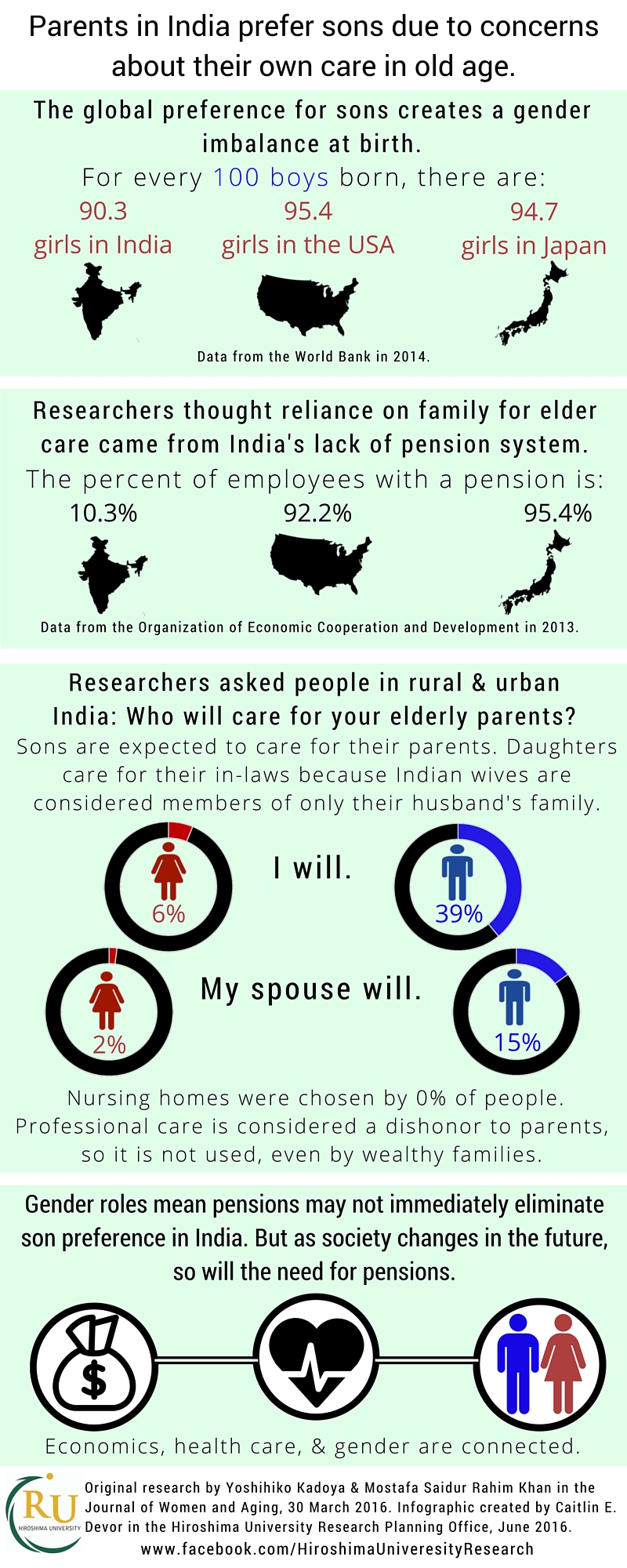Parents’ preference for sons persists globally, but the gender imbalance at birth remains most extreme in Asia, especially India. New analysis reveals that in India, the preference for sons might come from the expectation – even after controlling socioeconomic factors – that sons and their wives should care for elderly family members.
“Now we have the data to prove elder care motivates son preference, so we can move forward on how to understand this economic and healthcare issue,” said Yoshihiko Kadoya, Ph.D., lead author of the research study and currently Associate Professor in the Department of Economics at Hiroshima University.
The absence of national pension or socialized healthcare systems in India means that the elderly cannot rely on the government to provide even the most basic financial and medical support. The elderly must rely on family members for basic necessities when they stop working.
“It is a complicated issue with no definitive data to support such extrapolations, but we can imagine how pension systems in other countries affect the global economy: if individuals can rely on a pension system for their future, that frees people to spend more money now on consumable goods and services, rather than saving all of their money to survive in old age,” said Kadoya.
After marriage, daughters in India are considered part of only their husband’s family. Even without cultural pressures, daughters may live long distances from their own parents, making daily care-giving impractical. Without sons, parents will have no immediate family left to rely on as they age.
Although sons are expected to provide financial support, daughters-in-law are expected to provide the day-to-day basic physical assistance that elderly parents may require.
In-person survey interviews were performed in 2013 with a total of 577 people in ten different areas of urban and rural India. Researchers analyzed the data using mathematical models to search for differences between people living in urban or rural areas and found none. The belief that sons will care for elderly parents was widespread despite any variables they considered.
When individuals were asked who should care for their parents, about 40 percent of sons take full responsibility. This response matches with answers from daughters, about 68 percent of whom answered that their sibling and their sibling’s spouse should care for their parents.
A combined total of only 0.21 percent of sons and daughters answered that their parents should rely on in-home personal care and zero percent considered a nursing home or assisted living home an acceptable option. Regardless of their financial ability to pay for professional care, almost no one wanted to rely on anyone other than family for support as they age.
Even if parents only have daughters, the interview participants answered that other family members should care for them rather than using professional care. In India, professional care is considered a dishonor to parents.
Based on their analysis of survey data, researchers predict that even if India created a universal pension system now, individuals are unlikely to immediately lose their preference for sons.
“Every country’s situation is unique, but we can make a guess about the future of aged care in India by looking at what is currently happening in China, which has a relatively new pension system. As more women become more educated, there are fewer daughters-in-law staying home to care for their husbands’ elderly parents. Eventually, this creates the need for a reliable pension system,” said Kadoya.
“If parents can rely on a stable pension for their care rather than a hypothetical future daughter-in-law, then that reduces the motivation to prefer sons. Eventually, the gender imbalance might correct itself,” said Kadoya.

IMAGE TITLE: Infographic of Hiroshima University research study examining son preference in India by Y Kadoya and MSR Khan.
IMAGE CAPTION: Global economic information and new research from Hiroshima University reveal the connections between healthcare, economics, and gender balance in India.
IMAGE CREDIT: Infographic created by Caitlin E. Devor, Hiroshima University.
IMAGE LICENSE: Image may only be re-used with attribution.
Funding:
This work was supported by JSPS KAKENHI Grant Number 15K17075 and the MURATA SCIENCE FOUNDATION Grant ID: H2710.
Full Citation:
Authors: Yoshihiko Kadoya & Mostafa Saidur Rahim Khan
Title: Can concern for the long-term care of older parents explain son preference at birth in India?
Journal: Journal of Women & Aging (2016)
DOI:10.1080/08952841.2015.1138048
Media Contact:
Norifumi Miyokawa
pr-research*office.hiroshima-u.ac.jp (Please replace * with @)
Find more Hiroshima University news on our Facebook page: Hiroshima University Research

 Home
Home